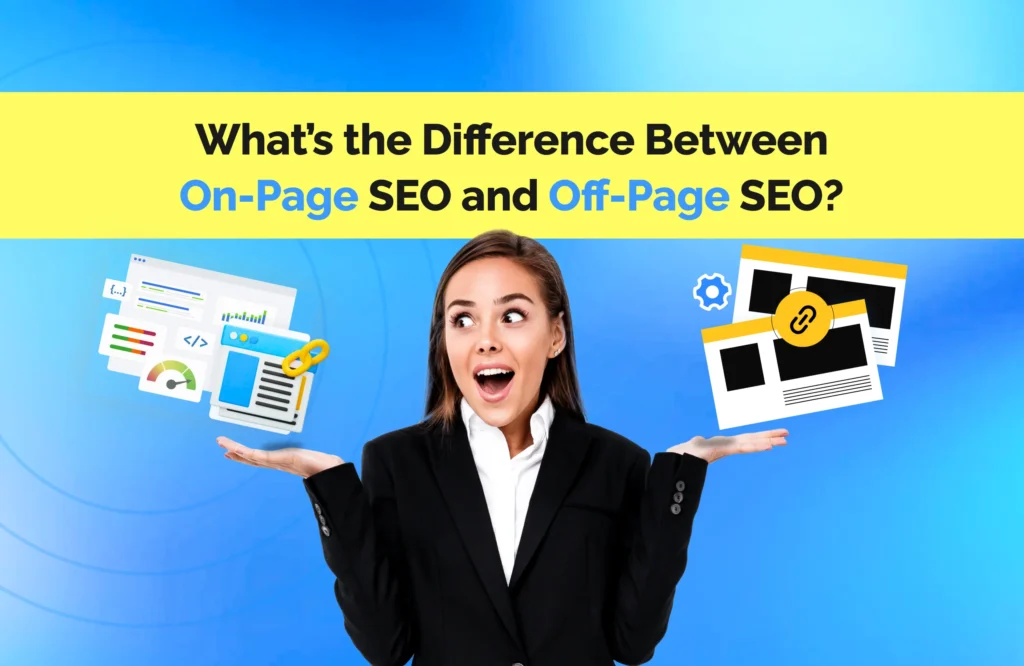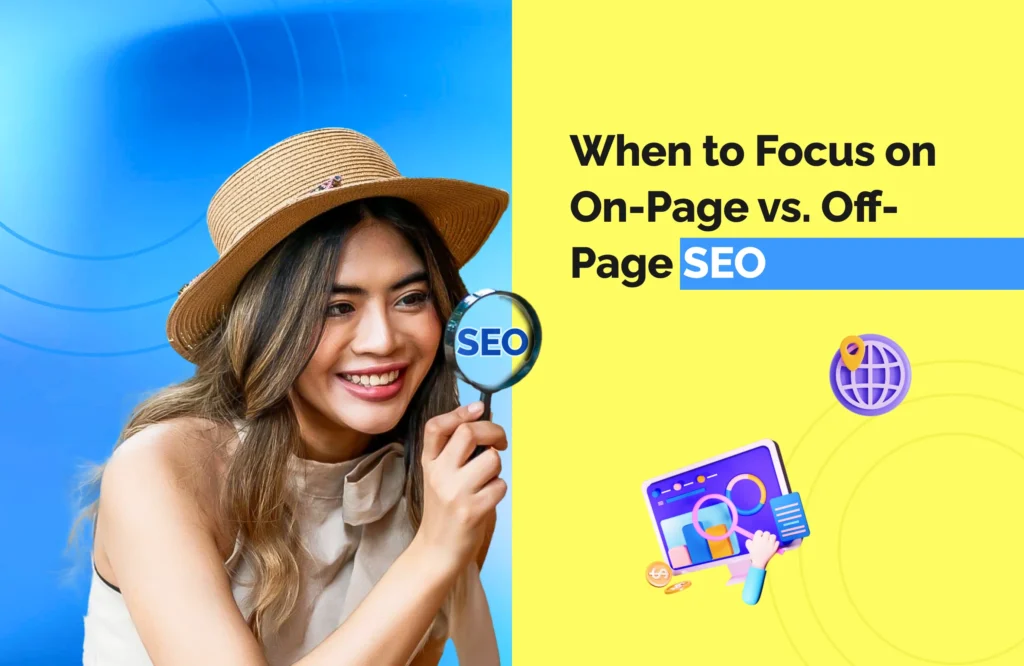People spend hours crafting content, but if no one can find it, what’s the point?
If you’re not ranking, you’re missing out.
SEO isn’t just for websites anymore. It’s for blogs, landing pages, eCommerce stores, social media profiles — you name it. They all live and die by how easily people can find them. And if they can’t find your content, it might as well not exist.
The sad truth? Great content doesn’t matter if it’s not ranking. That’s where On-Page and Off-Page SEO come into play.
Most people hear “SEO” and think it’s this massive, complex puzzle. Algorithms, keywords, rankings — it’s easy to get lost, right?
SEO isn’t that complicated. It’s about two things — what’s happening on your content and what’s happening off it.
On-Page SEO is all the stuff you can control directly. The titles, the content, the internal links. It’s how you make sure Google knows exactly what your page is about.
But that’s just part of the equation.
Off-Page SEO is the external stuff — backlinks, mentions, reviews. It’s like your digital street cred, and Google pays attention to it.
If you want more visibility, more clicks, and traffic that actually converts, you need both. In this post, I’m going to show you exactly how On-Page and Off-Page SEO work together to make it happen.
What is On-Page SEO?

On-Page SEO refers to the actions you take on your webpage to optimize it for search engines.
In other words, it’s all about making sure Google understands exactly what your content is about and why it’s valuable.
When you focus on On-Page SEO, you’re essentially setting the foundation for your content to rank higher in search results.
Think of it as the tweaks and changes you can make directly to the elements of your page.
This can include optimizing content, structuring your page, and ensuring it’s technically sound so search engines can easily crawl and index it.
The idea is simple: make your content easy to read, relevant to searchers, and easy for search engines to digest. The better Google can understand what your page is about, the more likely it is to rank it in relevant searches.
In short, On-Page SEO is your way of telling Google, “This is exactly what my page is about, and this is why it’s worth ranking.”
On-Page SEO Factors
These are the elements you’ll need to focus on to make sure your content gets noticed by Google and ranked accordingly.
1. Title Tags
The title tag is one of the most important On-Page SEO factors. It’s the first thing both search engines and users see when they land on your page.
A well-crafted title tag tells Google exactly what your page is about and encourages users to click. Make sure it’s clear, concise, and includes your target keyword.
2. Meta Descriptions
Although meta descriptions aren’t a direct ranking factor, they still matter. These short, persuasive summaries appear beneath the title in search results.
A well-written meta description can significantly boost your click-through rate (CTR). Keep it relevant, engaging, and around 150–160 characters long.
3. URL Slugs
Your URL structure should be clean and descriptive. A short, keyword-rich URL helps search engines understand the content of the page and makes it easier for users to remember and share. Avoid long, complicated URLs — keep them simple and to the point.
4. Heading Tags
Heading tags (H1, H2, H3, etc.) are important for both content structure and SEO. The H1 tag is typically reserved for the main title of your page, while H2 and H3 tags break the content into smaller, digestible sections.
Proper use of headings not only improves readability but also helps search engines understand the structure of your content.
5. Content Quality
Content is king — but quality content is what wins. Google rewards content that’s original, useful, and comprehensive.
To improve rankings, your content should match search intent, be easy to read, and provide value. Aim for content that answers users’ questions better than your competitors.
6. Image Alt Text
Every image on your page should have alt text. This serves two purposes: it describes the image for users with visual impairments, and it helps search engines understand the content of the image. Use descriptive, keyword-friendly alt text to improve your SEO and rank in image searches.
7. Internal Links
Internal linking helps spread link equity throughout your site, improving the SEO of multiple pages.
It also helps users navigate your website, leading them to related content. Use relevant anchor text and link to pages that will enhance the user experience.
8. Page Speed
A slow-loading page is a major turn-off for users and search engines alike. Google factors page speed into its ranking algorithm, so making sure your site loads quickly is critical.
Compress images, minify code, and use a reliable hosting provider to improve load times.
9. Mobile Friendliness
With mobile-first indexing, Google prioritizes mobile-friendly websites. Make sure your site is responsive and offers a seamless experience across all devices.
This doesn’t just help with rankings — it also keeps your users happy.
10. User Engagement
Google looks at user engagement signals, such as time spent on page, bounce rate, and click-through rates, to determine how useful your content is.
To improve engagement, create content that resonates with your audience and encourages interaction.
11. Schema Markup
Schema markup helps search engines better understand the context of your content. By adding structured data to your pages, you can enhance your listings with rich snippets, such as ratings, reviews, and other useful information that stand out in search results.
12. Relevant Keywords
While keyword stuffing is a thing of the past, using relevant, targeted keywords is still important. Use your keywords naturally in your content, title tags, and headings. Make sure you’re addressing the user’s search intent with the keywords you choose.
What is Off-Page SEO?

If On-Page SEO is all about optimizing your content on-site, Off-Page SEO focuses on building your site’s reputation, authority, and trustworthiness through activities outside your website.
It’s everything you do off-site that helps your rankings.
The main part of Off-Page SEO is backlinks — links from other websites pointing to yours. Google sees these backlinks as votes of confidence.
The more quality links you have, the more authority you build in Google’s eyes.
But it’s not just about backlinks. Off-Page SEO also includes brand mentions, social media signals, reviews, and influencer marketing.
Even without direct links, mentions boost your site’s authority and credibility.
In short, Off-Page SEO is about external signals that shape Google’s view of your site.
The more trustworthy and authoritative your site appears, the higher it can rank.
Off-Page SEO Factors
Off-Page SEO isn’t just about backlinks — it involves a range of activities that help build your website’s reputation and authority across the web.
These external factors play a huge role in your search engine rankings and visibility.
Here are some of the key Off-Page SEO factors that can help boost your site’s authority:
1. Backlinks
Backlinks are the cornerstone of Off-Page SEO.
They are links from other websites pointing to your content.
Google sees each backlink as a vote of confidence, meaning the more high-quality, relevant sites linking to you, the more Google trusts your content.
The key is getting backlinks from authoritative, niche-relevant websites.
1. Google Business Profile
For local businesses, a well-optimized Google Business Profile is crucial. It helps improve visibility in local searches and contributes to your Off-Page SEO. Make sure your business information is accurate, and encourage customers to leave reviews.
2. Social Media SEO
While social media signals don’t directly impact rankings, they play a role in driving traffic to your site and indirectly supporting your SEO efforts. Shares, likes, comments, and mentions can increase brand awareness and encourage backlinks, which ultimately help your site’s authority.
3. NAP Citations
NAP stands for Name, Address, and Phone Number. For local SEO, consistent NAP citations across business directories and listings help establish your business’s credibility and improve local search rankings.
4. Reviews and Ratings
Online reviews, especially on platforms like Google, Yelp, and Trustpilot, can affect your SEO. Positive reviews help improve your reputation, and Google uses them as a ranking factor, particularly for local businesses.
5. Guest Blogging
Guest blogging involves writing posts for other websites in your industry and including backlinks to your own site. It’s a great way to build authority, drive traffic, and earn valuable backlinks from reputable sites in your niche.
6. Unlinked Brand Mentions
Even if someone mentions your brand without linking to your site, it still counts as a form of Off-Page SEO. Reach out to those websites to turn unlinked mentions into backlinks, boosting your authority further.
7. Influencer Marketing
Collaborating with influencers in your industry can help spread the word about your brand and generate backlinks. Influencers have established trust with their audiences, and their endorsement can give your site more credibility.
8. User-Generated Content (UGC)
Encouraging customers or users to create content around your brand, like reviews or testimonials, can help boost your SEO. UGC shows that people are engaging with your brand, which signals to Google that your content is valuable.
9. Social Bookmarking
Submitting your content to social bookmarking sites like Reddit, Pinterest, and Digg can help increase its visibility and generate backlinks. This is especially helpful in driving traffic and attracting attention to new content.
10. Independent Reviews and Mentions
Getting organic reviews on third-party platforms and mentions in media or industry-related websites also contribute to your Off-Page SEO. These reviews and mentions increase your site’s trustworthiness and authority in the eyes of search engines.
11. Content Marketing
Content marketing is another powerful way to build backlinks. By creating high-quality blog posts, infographics, videos, and other shareable content, you encourage others to link to your website, boosting your authority and improving your rankings.
What’s the Difference Between On-Page SEO and Off-Page SEO?

So, what’s the big difference between On-Page SEO and Off-Page SEO?
On-Page SEO is all the work you do inside your website or content.
It’s the stuff you have full control over. Things like optimizing your titles, tweaking your content, improving your URL structure, and adding internal links — that’s all On-Page SEO.
The idea is simple: you’re telling Google exactly what your page is about.
You’re laying the foundation for your content to get found and ranked by search engines. The goal is to make your content as relevant and accessible as possible.
Now, Off-Page SEO is the opposite — it’s all about what happens outside of your content.
It’s everything you can’t control directly, but that still plays a major role in your rankings. Think backlinks from other websites, mentions on social media, online reviews, and more.
These signals tell Google that other people trust and value your content.
In short, On-Page SEO is about making your content understandable and relevant to search engines, while Off-Page SEO is about building trust and authority through external signals.
Both are critical. Without On-Page SEO, Google won’t even know what your page is about. And without Off-Page SEO, even the best content might not get the recognition it deserves. Together, they work like a powerful one-two punch to help you rank higher and get noticed.
When to Focus on On-Page vs. Off-Page SEO

To build a strong SEO strategy, it’s important to know when and why you should focus on On-Page SEO versus Off-Page SEO.
Each has its own role, and understanding the best times to focus on each can significantly impact your results.
Start with On-Page SEO. This is your first step. Before anything else, you need to make sure that your website is optimized for both search engines and users.
On-Page SEO includes all the things you can control on your site: optimizing content, ensuring a clean URL structure, crafting effective title tags and meta descriptions, ensuring fast loading speeds, and improving overall usability.
This is the foundation of SEO because, without a properly optimized page, Off-Page SEO (like backlinks or social signals) won’t have much of an impact.
When to focus on On-Page SEO:
- Before you do anything else: If you’re launching a new website or blog, prioritize On-Page SEO first. Without it, your site won’t rank well, regardless of external signals like backlinks.
- When updating or refreshing content: If you’re revamping old content or adding new pages to your site, make sure to optimize them before focusing on external factors.
- When you’re targeting new keywords or niches: Each time you target new search terms, you’ll want to ensure the On-Page SEO is perfectly aligned with those terms.
Once On-Page SEO is done and your site is fully optimized, it’s time to move to Off-Page SEO. Off-Page SEO builds your website’s authority and signals to Google that your site is credible and relevant.
This mainly involves getting backlinks, gaining mentions on other platforms, and building your online reputation through reviews and social media activity.
When to focus on Off-Page SEO:
- Once your content is optimized: After you’ve made sure your site is well-structured and optimized, Off-Page SEO becomes much more effective. If your content isn’t solid, even the best backlinks won’t help.
- To boost rankings over time: Off-Page SEO is crucial for maintaining and improving your rankings in the long run. Backlinks, social media mentions, and influencer partnerships help solidify your site’s authority.
- After your site has gained some traction: Once you have some content published and indexed, start building external signals through Off-Page SEO to further boost your rankings and drive more traffic.
On-Page SEO is your starting point — it’s about making your website or content searchable, relevant, and user-friendly. Once that’s in place, Off-Page SEO helps your site build authority, gain trust, and get noticed in a crowded digital space.
FAQs
1. How does user experience (UX) impact On-Page SEO?
User experience is a huge factor in On-Page SEO. Google values websites that offer a smooth, intuitive experience for users.
If your site is hard to navigate, loads slowly, or isn’t mobile-friendly, it can negatively affect your rankings.
A good UX encourages longer visits, higher engagement, and fewer bounce rates, which are all positive signals to search engines.
2. Can social media activity influence Off-Page SEO?
Yes, social media can influence Off-Page SEO indirectly. While social signals (likes, shares, and comments) don’t directly impact rankings, they can drive traffic to your website, increase brand awareness, and encourage other websites to link to your content. Social media mentions and shares act as indicators that your content is valuable and relevant.
3. Is it possible to improve Off-Page SEO without backlinks?
Backlinks are a significant part of Off-Page SEO, but they aren’t the only factor.
Mentions of your brand or content (without links), reviews, and positive user-generated content (UGC) such as testimonials can also improve your site’s authority.
Building an active online presence through media coverage, social proof, and influencer partnerships can also contribute to Off-Page SEO.
4. How do I get high-quality backlinks for my website?
To earn high-quality backlinks, focus on creating exceptional, share-worthy content that people in your industry will naturally want to link to.
Guest blogging, creating informative and original research, and building relationships with influencers are effective ways to acquire backlinks.
Additionally, submitting your content to reputable directories and websites within your niche can help.
5. How do I measure the effectiveness of my Off-Page SEO?
You can measure Off-Page SEO effectiveness by monitoring backlinks, domain authority, and the overall growth of your website’s online presence.
Tools like Ahrefs, Semrush, and Moz provide backlink analysis, allowing you to track the quantity and quality of backlinks your site has earned.
Additionally, monitor social media engagement and mentions to gauge how well your brand is performing.
6. How important are anchor texts in Off-Page SEO?
Anchor text plays a crucial role in Off-Page SEO. It’s the clickable text in a hyperlink that provides context for both users and search engines.
When acquiring backlinks, ensure the anchor text is relevant and natural. Avoid keyword stuffing in anchor text, as over-optimization can lead to penalties.
A mix of branded, generic, and keyword-rich anchors is the most effective approach.
7. What role does content length play in On-Page SEO?
Content length can influence On-Page SEO, but it’s not the only factor. Longer content tends to perform better because it allows you to cover topics in greater detail and provide more value to readers.
However, quality matters more than length. If your content is long but doesn’t address search intent or add value, it won’t help your SEO.
To get the best results, use SYNBUDDY—a powerful SEO tool that helps you optimize content for both quality and relevance.

